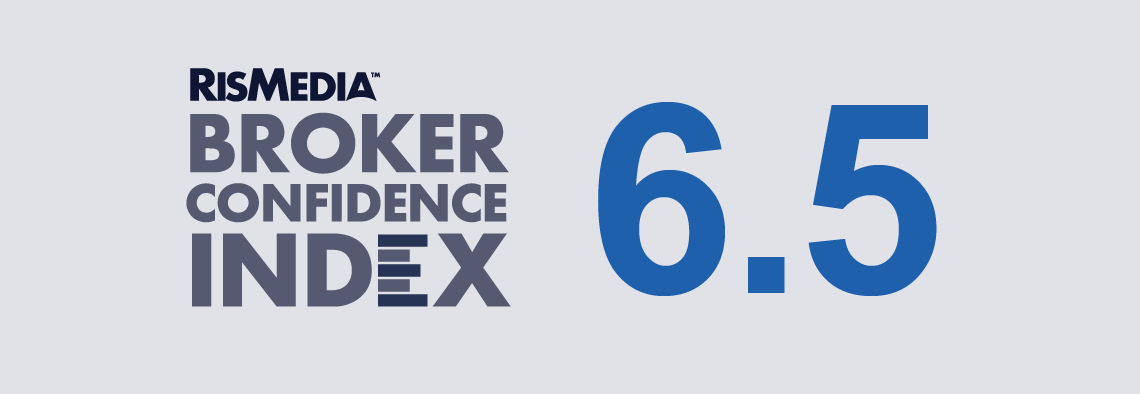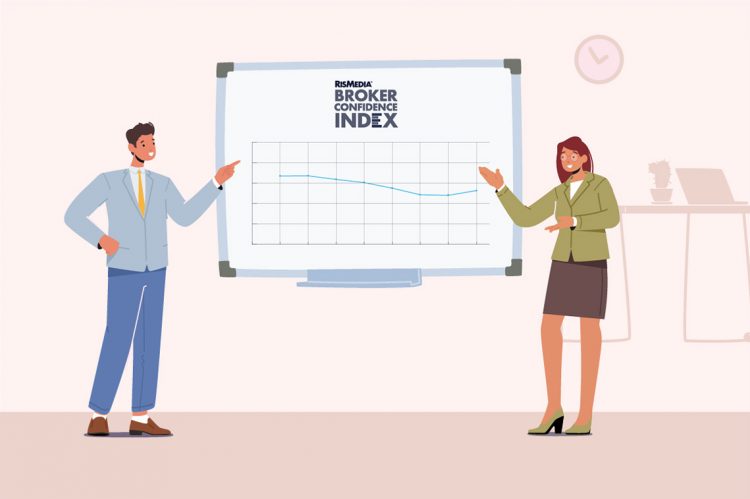Editor’s Note: Enter your email or log in to your Premier account to view video analysis of the historic February BCI increase and hear what brokers around the country are expecting for this year’s market.
The start of the new year is coinciding with a huge swell of optimism from real estate leaders, as RISMedia’s Broker Confidence Index (BCI) saw its largest single-month increase ever in January, shooting up from 5.5 to 6.5 against a backdrop of positive economic data and signs of new life in many markets.
 After falling steadily through nearly all of 2022, the BCI saw a minor uptick in December, with brokers expressing cautious optimism about a rebounding market. That proved to be no temporary blip, as these brokers reported more significant positive movements in their markets, with new interest from both buyers and sellers as the potential for a turnaround in 2023 grows.
After falling steadily through nearly all of 2022, the BCI saw a minor uptick in December, with brokers expressing cautious optimism about a rebounding market. That proved to be no temporary blip, as these brokers reported more significant positive movements in their markets, with new interest from both buyers and sellers as the potential for a turnaround in 2023 grows.
“Phones are ringing and appointments are being set, for both showings and listings,” reports Lynn Fillingham, broker/owner of RE/MAX Marketplace in Mississippi.
Ready for a rally?
Data that showed a surprise jump in pending home sales in January (and a less surprising increase in mortgage applications) clearly reflected what brokers were seeing on the ground, as many marked increased consumer confidence in their markets, as well as noticeable increases in activity.
At the same time, however, the current state of housing—and the economy at large—remains broadly uncertain, and most respondents to the latest BCI survey tempered their optimism, pointing out longer-term challenges with inventory, rates and inflation.
But the overall reading of 6.5—a level that hasn’t been seen since last August—indicates that in the short term at least, real estate markets are starting off 2023 on the upswing as a variety of factors seem to have brought consumers back out to buy and sell homes.
“Sales—from activity, to pending, to closings—are rising after a slowing last half of 2022,” says Ron Howard, VP of Sales at John R. Wood Christie’s International Real Estate in Florida. “We also must remember the slowing is off of record years that were above expectation.”
Maybe more than any concrete changes in rates or inventory, a change in mentality appears to be bolstering real estate activity. More than a few brokers mentioned anecdotally that consumers appeared to understand that they will not get a 3% interest rate just by waiting.
Larry Rideout, CEO of Gibson Sotheby’s International Realty in Massachuesetts, attributed an influx of buyers in his region to a “softening” of the mental shock of rising mortgage rates, which increased at a historically fast pace in 2022.
Going back to last spring, brokers polled in the BCI have decried how overbroad or sensationalized media reports have scared consumers off, even as economists have mostly agreed that a major housing crash is unlikely, and noted that mortgage rates of 5% or 6% were normal in recent history.
After several months, at least some potential buyers and sellers seem to have accepted the new market conditions.
“Sales are better than expected, and customers seem to be accepting the higher interest rates,” says Craig Beggins, president and CEO of CENTURY 21 Beggins Enterprises in Florida.
Who’s got homes?
Ironically, as demand surges again, a lack of homes for sale is becoming a problem, with brokers now singling out inventory as the biggest challenge in their markets—a major reversal from 2022, when rates were most often cited, but harkening back to the pandemic feeding frenzy of 2020 and 2021.
“Inventory remains low, which is our biggest challenge…right now,” says Paul Grover, co-founder and principal broker of Berkshire Hathaway HomeServices Robert Paul Properties in Massachusetts. “We ended 2022 with far fewer sales than the previous year, but prices are holding.”
This month, RISMedia asked brokers to identify what single challenge they saw as most significant to the industry in 2023, as well as how confident they were in overcoming that challenge.
Inventory was the overwhelming choice, with nearly half (47%) seeing a lack of homes as the main obstacle for real estate practitioners this year.
“Intense spikes of homes going under contract within the first 30 days,” reported Lennox Scott, owner of John L. Scott Real Estate. “Shortage of unsold inventory, few new listings coming on the market until March.”
Mortgage rates came in second, with 33% of brokers worried about the cost of borrowing. Next was affordability at 16%, followed by inflation at 4%.
 A lack of concern about inflation is evidence that brokers are confident that the Fed has done enough to tame price increases—though whether the central bank may have gone too far, pushing the economy into a painful recession, remains uncertain.
A lack of concern about inflation is evidence that brokers are confident that the Fed has done enough to tame price increases—though whether the central bank may have gone too far, pushing the economy into a painful recession, remains uncertain.
Because the inventory crunch is a more structural, longer-term problem, real relief this year seems unlikely. Interestingly, though, brokers who selected inventory as their biggest concern this year were relatively confident in overcoming it—weighing in at 6.8.
Brokers who saw mortgage rates as the main obstacle were even more optimistic, rating their confidence an average of 7.3. Those who were most worried about affordability—another long-term issue—were also surprisingly confident, the same average confidence level of 7.3.
Those who chose inflation reported a dismal average confidence level of 4—likely reflecting a lack of confidence that the Fed will be able to get price increases under control, which could create many more long-term problems akin to the “stagflation” of the late 1970s and early 1980s.
 Overall, though, brokers were even more confident in overcoming big obstacles this year than they were in the current market, with an average confidence level of 6.7.
Overall, though, brokers were even more confident in overcoming big obstacles this year than they were in the current market, with an average confidence level of 6.7.
While clearly the biggest uncertainties for real estate in 2023 remain structural, and will largely depend on policy moves by the Fed and the machinations of the broader economy, the fact that some brokers attribute positive changes to a new consumer mindset (or blame negative media for depressed activity) suggests that other factors might be at play as well.
“Agents are reporting that buyers are calling and moving forward again with home purchases,” says Jolene Weinstein, senior vice president of Sales at Realty Austin in Texas. “Multiple offers in some areas, hoping sellers will feel confident to list again.”












